
A web developer uses various technologies to ensure that websites function well, provide a seamless user experience, and perform efficiently. They work on multiple projects, including informational websites, e-commerce platforms, and web applications.
There are three primary types of web developers: front-end developers, back-end developers, and full-stack developers. A front-end developer focuses on creating a website's visual and interactive aspects. A back-end developer handles the server-side elements. A full-stack developer combines both front-end and back-end development skills.
The skills and technologies used by web developers include programming languages like JavaScript, Python, PHP, and Ruby, as well as frameworks like React.js, Angular, Node.js, and Django. They also use development tools such as Git for version control, Webpack for bundling, and Docker for containerisation.
Web developers follow a structured process to create websites, which involves planning, designing, coding, testing, and deployment. The process begins with gathering requirements and defining the website's scope. Designers then create mockups, and developers write the code. The website is tested. Finally, it is deployed, and ongoing maintenance takes place.
To hire a web developer, you explore various platforms where freelance developers offer their services, such as Upwork, Fiverr, and Toptal. Alternatively, you opt for a web developer company like Intelivita, which provides a team of professionals to manage all aspects of web development.
When hiring, factors such as the complexity of the project, budget, timeframe, and the developer's expertise should be considered. Businesses should also evaluate the developer's portfolio to assess their experience and the quality of their work.
According to a study by the National Institute of Technology (NIT) titled "Web Development Trends and Growth," 2022, the web development industry is projected to grow by 13% between 2020 and 2030, driven by the increasing demand for businesses to have an online presence.
Who Is A Web Developer?
A web developer is a professional responsible for building, designing, and maintaining websites and web applications. They use various programming languages, such as HTML, CSS, JavaScript, and multiple frameworks, to create the structure and functionality of websites. Their goal is to ensure that the website is visually appealing, user-friendly, and performs efficiently across different devices.
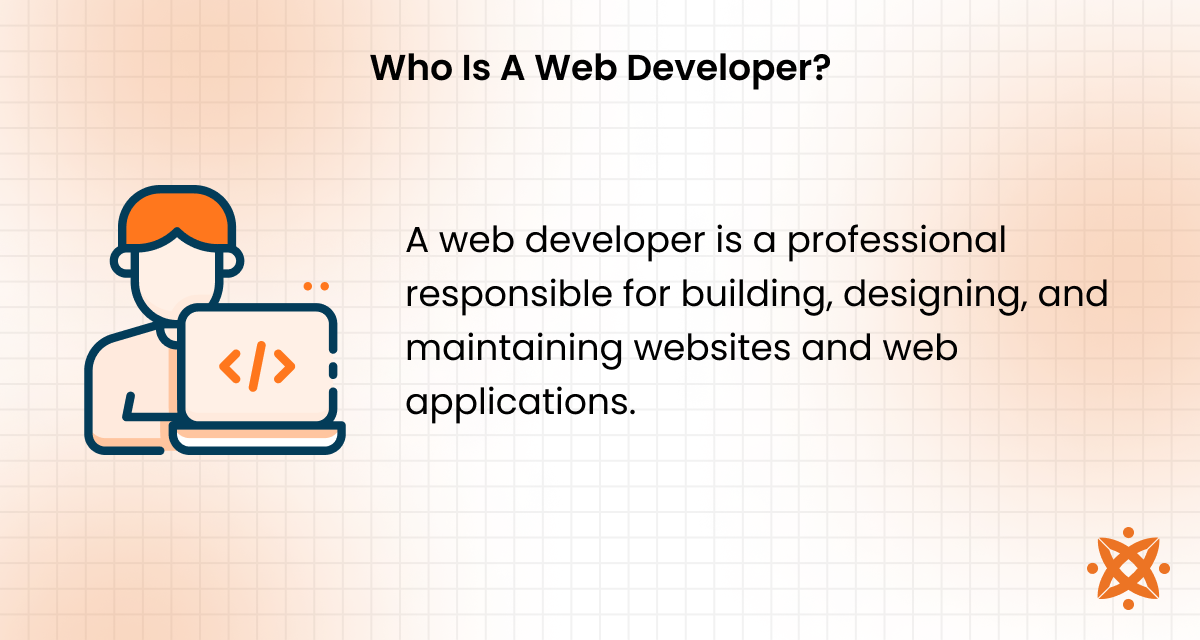
Hiring a web developer brings numerous benefits. They create websites tailored to meet specific business needs, ensuring they are responsive, user-friendly, and secure. Their expertise helps in implementing features such as online payments, secure login systems, and content management, which are important for modern businesses.
A skilled web developer also optimises website speed and performance, ensuring a seamless user experience. In addition to technical skills, web developers need to possess strong problem-solving abilities and good communication skills.
They often work in teams with designers, marketers, and other developers, translating complex technical requirements into actionable solutions. Time management, attention to detail, and creativity are also important traits for web developers to have in order to deliver high-quality work within deadlines.
While certifications are not always required, they boost a web developer's credibility. Certifications such as Certified Web Developer (CIW), Microsoft Certified: Azure Developer Associate, and W3C Web Accessibility demonstrate a developer's commitment to their profession and ensure that they are up to date with the latest technologies and best practices.
The role of web developers began with the creation of the World Wide Web in the early 1990s. Early developers focused mainly on static websites using HTML. As technology advanced, dynamic content and interactive websites became the norm, leading to the rise of tools like JavaScript and CSS.
Today, web developers use a wide range of technologies, including full-stack frameworks and content management systems, to meet the growing demands of the internet. According to a study by the US Bureau of Labor Statistics titled "Occupational Outlook Handbook," 2020, the employment of web developers is projected to grow by 13% from 2020 to 2030, much faster than the average for all occupations.
This growth is driven by the increasing demand for businesses to establish an online presence. The average salary for a web developer in the UK in 2020 was around £30,000, with more experienced developers earning higher salaries.
What Does A Web Developer Do?
A web developer is responsible for designing, building, and maintaining websites and web applications. Their day involves writing and testing code, debugging issues, and collaborating with other team members, such as designers and project managers. They ensure that websites are functional, responsive, and user-friendly.
Web developers also focus on improving website performance, making sure the website loads quickly and works seamlessly across different devices and browsers. Depending on the project, a web developer's day includes tasks like designing new features, integrating third-party services, and ensuring the website's security.
What Is Website Development?
Website development refers to the process of creating and maintaining websites and web applications. It involves designing the layout and functionality and writing the code that powers the site. Web development focuses on either the front end, which deals with the visual elements users interact with, or the back end, which handles databases and server-side functionality.
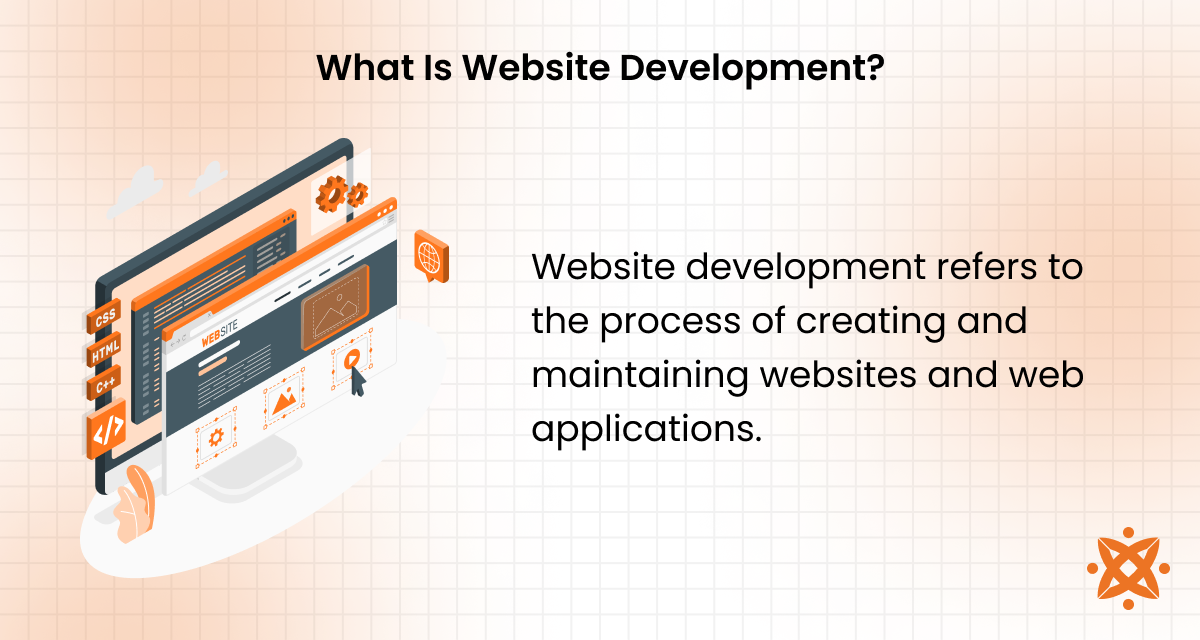
You've probably interacted with many types of websites, such as e-commerce platforms like Amazon, where you browse products and make purchases. News sites like the BBC provide updates and articles, while corporate websites offer company details, services, and customer contact information. Even blogs like WordPress provide platforms for sharing articles and personal experiences.
Key features during website development include its navigation, interactive elements like buttons and forms, and content layout. Websites also need a responsive design to ensure they work well on devices of all sizes. Depending on the site type, you'll also find important features like contact forms, social media links, and e-commerce shopping carts.
For small businesses, a website is more than just a digital brochure. It establishes credibility, allowing potential customers to trust the company. With a website, you reach a global audience, market your products or services at all times, and provide potential customers with easy access to your business information.
What Are The Different Types Of Web Developers?
The different types of web developers are front-end developers, back-end developers, and full-stack developers. Each type focuses on specific areas of web development and contributes to a website's overall functionality and user experience.
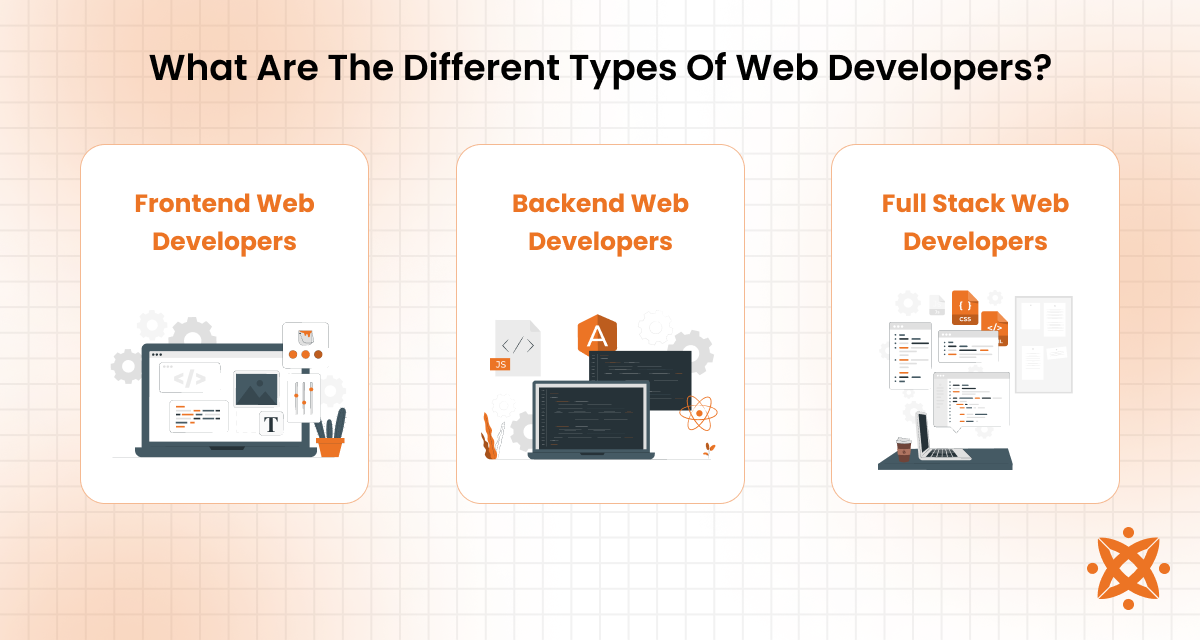
The different types of web developers are as follows:
Frontend Web Developers
A frontend web developer focuses on the part of a website or web application that users directly interact with. This role involves creating the layout, design, and structure of a site, ensuring that it is both visually appealing and functional.
The role requires a solid understanding of HTML, CSS, and JavaScript. Front-end developers use these technologies to structure content, style it, and make it interactive. In addition, they must be familiar with libraries and frameworks like React.js, Vue.js, and Angular.
These tools help streamline the development process and improve website performance. They also need to ensure the website is responsive, meaning it functions well across different devices, from desktops to mobile phones.
Backend Web Developers
A backend web developer focuses on the server side of web development. They are responsible for building and maintaining the systems that run behind a website's scenes, ensuring that everything functions properly and efficiently.
This role involves working with server-side languages like PHP, Python, Ruby, and Node.js to create the logic and database connections that power a website's functionality.
Backend developers also work with databases such as MySQL, PostgreSQL, and MongoDB, handling data storage and retrieval. Additionally, they use frameworks like Django, Ruby on Rails, or Express.js to streamline development and enhance performance.
Full Stack Web Developers
A full-stack web developer is skilled in both front-end and back-end development and handles every aspect of a website's development from start to finish. This role requires expertise in creating both the visible components of a site and the underlying systems that drive it.
Full-stack developers must have a deep understanding of frontend technologies like HTML, CSS, JavaScript, and frameworks such as React.js or Vue.js. On the back end, they should be proficient in server-side languages like Node.js, Python, or Ruby, and work with databases like MongoDB, MySQL, and PostgreSQL.
Full-stack developers also need knowledge of development tools and platforms such as Git for version control and Docker for containerisation.
What Is The Difference Between Frontend, Backend, And Full Stack Web Developers
The main difference between front-end, back-end, and full-stack web developers lies in theareas of web development they specialise in. A front-end developer focuses on the parts of a website or application that users interact with directly, ensuring the site is visually appealing and user-friendly.
A backend developer works behind the scenes, handling the server-side functionality, databases, and logic that drive the website. A full-stack developer, on the other hand, is proficient in both frontend and backend development and manages all aspects of web development, from design to functionality.
The differences between frontend, backend, and full-stack web developers are given below:
| Developer Type | Focus Area | Main Skills & Technologies |
| Frontend Developer | User interface and design | HTML, CSS, JavaScript, React.js, Vue.js, Angular |
| Backend Developer | Server-side and databases | Node.js, PHP, Ruby, Python, MySQL, MongoDB, PostgreSQL |
| Full Stack Developer | Both frontend and backend | HTML, CSS, JavaScript, React.js, Node.js, Python, MySQL, MongoDB |
What Are The Key Skills And Technologies For Web Developers?
The key skills and technologies for web developers include programming languages, frameworks, and tools that allow them to build functional and efficient websites. These skills help developers create websites that are fast, responsive, and user-friendly.
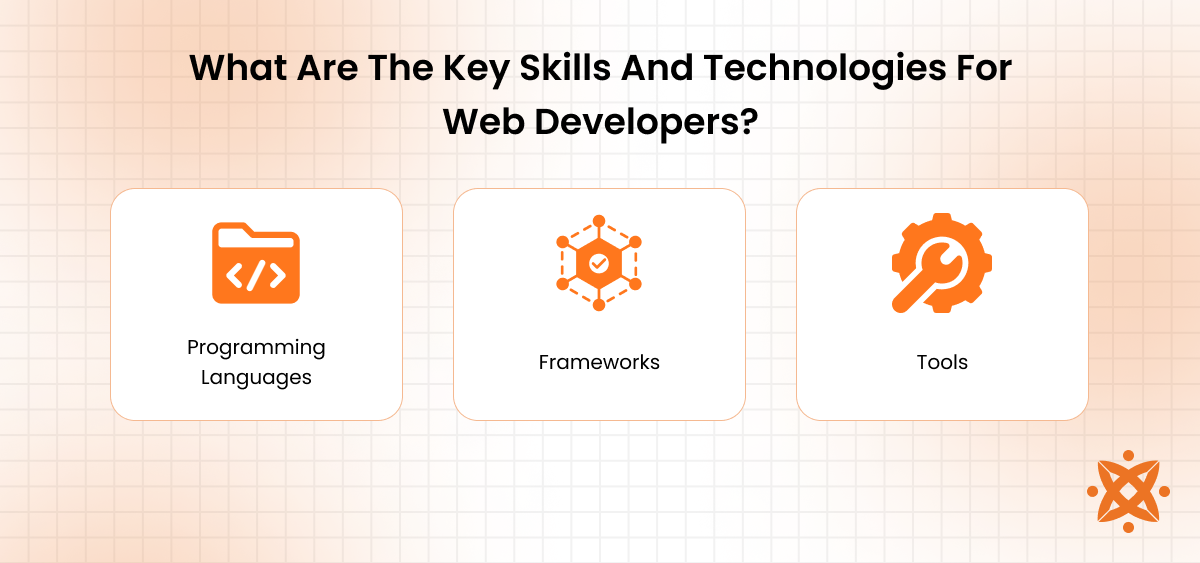
The Key Skills and Technologies for Web Developers are:
- Programming Languages: These are the fundamental languages used to write the code that powers websites. Examples include HTML for structure, CSS for styling, and JavaScript for interactivity. Other languages such as PHP, Ruby, and Python are also important for backend development.
- Frameworks: Frameworks provide pre-written code that developers use to streamline the development process. For example, React.js and Angular are popular for frontend development, while Node.js and Django are commonly used for backend development. Frameworks help developers create websites more quickly and with fewer errors.
- Tools: These help developers manage their work and improve efficiency. Tools such as Git for version control, Webpack for bundling assets, and Docker for containerisation are vital in modern web development. They allow for better collaboration, code management, and website deployment.
How Web Developers Design And Develop Websites?
Web developers design and develop websites by following a structured process thatinvolves planning, design, development, and testing. This process ensures that the website is functional, user-friendly, and meets your specific requirements.
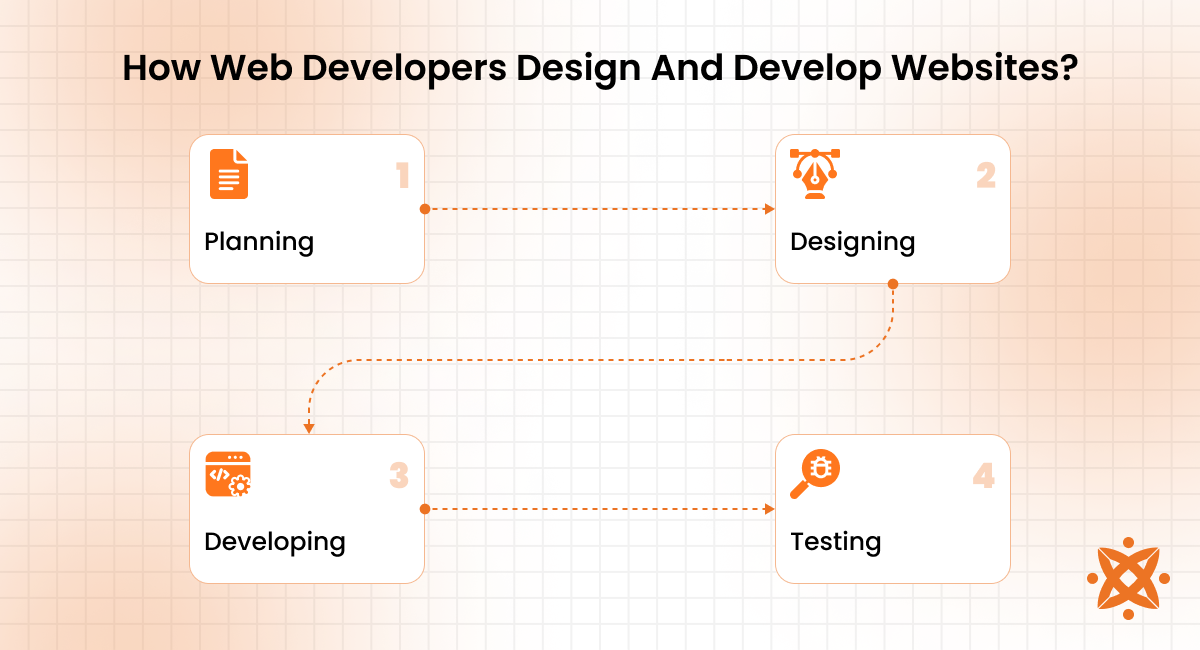
The steps that web developers use to design and develop a website are:
Planning
This is the first step in web development. Developers work with clients to define the website's goals and requirements. They then create a project roadmap outlining features, content, and design aspects.
Designing
The design phase focuses on the website's visual and user experience elements. Developers create wireframes and mockups to define the site's layout and appearance. Tools like Adobe XD or Sketch are often used to make these designs.
Developing
During this stage, developers begin writing the code that will make the website functional. Frontend developers work on the design and user interface, while backend developers work on the server-side logic. Programming languages like JavaScript and PHP are commonly used here.
Testing
Once development is complete, the website undergoes testing to ensure it works across different browsers and devices. This includes checking functionality, speed, and user experience. Testing tools like Selenium or BrowserStack catch any issues before the website goes live.
How Much Do Web Developers Charge To Develop A Website?
The cost for hiring a web developer to develop a website ranges from £1,000 to £10,000, depending on various factors. The complexity of the website, the number of features required, the experience of the developer, and the timeframe all play a role in determining the final cost.
For example, a simple informational website costs less, while a more complex e-commerce site with payment systems, user accounts, and custom functionalities could cost more. Additional costs also arise from ongoing maintenance, hosting, and SEO services.
If you're looking for a skilled web developer for hire for your project, visit our Web Developer for Hire page for more details and to get a tailored quote.
Can Web Developers Use AI to Develop A Website?
Yes, web developers can use AI tools to assist in website development. AI helps streamline various aspects of web development, from code generation to design suggestions. For instance, tools like GitHub Copilot use AI to suggest code as developers type, speeding up the coding process and reducing errors.
AI-driven website builders, such as Wix ADI and Bookmark, allow non-developers to create websites by automating the design process based on user input. Additionally, AI tools like Firedrop use chatbots to assist in website design, providing real-time feedback and customisations.
According to the National Institute of Technology (NIT), "The Impact of Artificial Intelligence on Software Development", 2022, AI tools have increased coding efficiency by 40%, allowing developers to focus more on creative and complex tasks.
Are Freelance Web Developers Better Than Web Developer Companies?
Freelance web developers are better than web developer companies if you have a smaller project or a limited budget, as they often offer more flexible pricing and quicker turnaround times. Freelancers are ideal for businesses looking for specific expertise without the need for a large team.
Platforms like Upwork, Fiverr, and Toptal allow you to find freelance web developers with various specialisations, from front-end to back-end development. Freelancers are more cost-effective for smaller websites or specific tasks like landing page design.
However, web developer companies are better if you're looking for a larger-scale project with a team of developers, designers, and project managers to handle multiple aspects of web development. A web development company offers a more comprehensive service, including design, development, testing, and ongoing support. They are also ideal for complex projects that require long-term collaboration and a structured approach.
Intelivita is one of the best web development companies near you, offering a full range of web development services. With our team of experienced developers and a focus on quality, Intelivita ensures that every aspect of your web project is handled with professionalism and expertise.
What Is The Difference Between Web Developers And Web App Developers?
The main difference between web developers and web app developers is the type of project they specialise in. A web developer builds websites that are primarily informational, static or dynamic, with content that be updated over time.
On the other hand, a web app developer creates interactive applications that allow users to perform specific tasks, such as making purchases, managing data, or sending messages.
While both roles involve coding and creating web experiences, web app developers often work with more complex programming languages like JavaScript, Ruby on Rails, and Python to handle the functionality of web applications. Web developers focus on front-end technologies like HTML, CSS, and JavaScript to create a website's structure and design.
They also require a deep understanding of back-end development, as they deal with databases and server-side logic to ensure the app runs smoothly.
In summary, web developers typically create static websites for browsing and reading, while web app developers build interactive, functional web applications designed for user engagement and task completion.
What Is The Difference Between Web Developers And Software Developers?
The main difference between web developers and software developers lies in the type of applications they create. A web developer focuses on building websites or web-based applications that run in browsers, using technologies such as HTML, CSS, JavaScript, and various frameworks.
In contrast, a software developer creates standalone software applications that run on operating systems like Windows, macOS, or Linux, often involving programming languages such as Java, C++, or Python.
Web developers are primarily concerned with creating web pages, improving user interfaces, and ensuring functionality across different browsers and devices. Software developers, however, work on more complex applications that involve desktop software, mobile apps, or embedded systems. They need to focus more on algorithm design, memory management, and system performance, which are outside the scope of web development.
Web developers rely on pre-existing frameworks and content management systems like WordPress or Shopify. In contrast, software developers typically build applications from scratch or utilise specific software development kits (SDKs) for desktop or mobile environments.
In summary, while both roles involve programming, web developers specialise in web technologies and online applications. In contrast, software developers work on broader software solutions that often operate independently of the web.
What Is The Difference Between Web Developers And Web Designers?
The main difference between web developers and web designers is that web designers focus on a website's aesthetics and user experience. In contrast, web developers are responsible for turning those designs into functional, working sites.
A web developer is responsible for building a website's structure, functionality, and performance using code. They focus on ensuring the website works properly, loads quickly, and is accessible across various platforms and devices.
In contrast, a web designer focuses on the look and feel of a website, designing the layout, colours, typography, and visual elements to ensure a user-friendly and aesthetically pleasing experience.
While web developers work with technologies like HTML, CSS, JavaScript, and back-end frameworks, web designers create the site's visual layout using design tools like Adobe Photoshop, Sketch, and Figma.
Web designers also need to consider user experience (UX) and user interface (UI) design, ensuring that the site is not only beautiful but also easy to navigate. Web developers implement the designs created by web designers and ensure they function as intended, developing interactive features and ensuring the site works across different devices and browsers.
What Is The Difference Between A Web Developer And a Programmer?
The main difference between a web developer and a programmer is that web developers specialise in creating websites and web applications. In contrast, programmers have a broader skill set for developing various types of software beyond just the web.
A web developer specifically works on building and maintaining websites or web applications, focusing on both the frontend and backend aspects of web development. They use languages like HTML, CSS, JavaScript, and PHP to create websites that are functional and user-friendly.
On the other hand, a programmer (also known as a software developer) is a more general term for someone who writes code to develop software applications. Programmers work on various types of software, including desktop applications, mobile apps, and embedded systems, using languages like C++, Java, and Python.
While both web developers and programmers write code, web developers are specifically focused on web technologies, ensuring that websites function well on different browsers and devices. Programmers, however, often focus on building applications that operate independently of the web, such as desktop software or mobile apps.
Programmers also work on more complex software projects, dealing with system architecture and performance optimisation, while web developers typically focus on user interaction and web-specific functionality.
Never Miss an Update From Us!
Sign up now and get notified when we publish a new article!
Dhaval Sarvaiya
Co-Founder
Hey there. I am Dhaval Sarvaiya, one of the Founders of Intelivita. Intelivita is a mobile app development company that helps companies achieve the goal of Digital Transformation. I help Enterprises and Startups overcome their Digital Transformation and mobile app development challenges with the might of on-demand solutions powered by cutting-edge technology.
